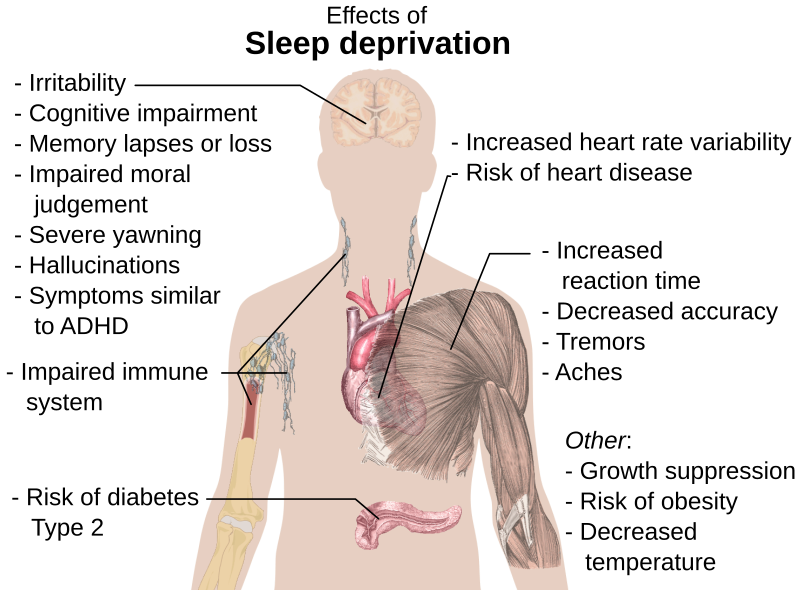How to Teach Your Non-Tech Savvy Parents Some Useful Skills
Sleep impecuniousness is pretty common these days—it'south a major attribute of accomplishment-oriented societies—but why would anyone have a love-hate relationship with it? Commonly, one would say,sleep deprivation and all the accompanying symptomsare the definition of a love-detest relationship, to the core.
Permit me tell y'all something: y'all canuse sleep impecuniousness for your own benefit. We'll go into how this works, but outset, let'due south talk over the miracle of slumber, sleep deprivation and its symptoms, and finally pattern a "how to" experiment about sleep deprivation(commonly known as cocky-torture), and ask ourselves, more chiefly, why?
Sleep: Functionality
"Sleep is a naturally recurring state characterized past reduced or absent consciousness, […] and inactivity of nearly all voluntary muscles." (Macmillan, 1981). This is a short and articulate explanation:
- slumber is characterized by slumber stages/cycles (five cycles, differing in depth)
- the deeper your sleep, the better the quality of sleep
- More than Sleep ≠ Better (healthy avg. 7.5-nine hours)
The functions of sleep are very multifaceted and majorly unexplored, but these (validated, and commonly accepted) aspects involvement us the well-nigh correct now. Sleep has a major touch on:
- on our memory and the ability to re-organize thoughts, experiences and to learn new things (neuroplasticity)
- on the regulation of necessary hormones and the ability of our torso to regenerate physically
What is Sleep Impecuniousness?
Sleep impecuniousness is the lack of sleep: either it was caused by a very superficial and short slumber (over a catamenia of some days) or by no slumber at all. The functionality and benefits of sleep are express as a result (meet above), and we might confront someserious problems, if we stay sleep-deprived for a prolonged period of time.
The effects of sleep impecuniousness are various; some occur instantly afteracute deprivation, other occur only afterchronic deprivation:

(by Mikael Häggström, Wikimedia Commons, 2009)
After acute deprivation:
- irritability
- cerebral impairment
- memory lapses
- restricted sentence
- astringent yawning
- increased centre-rate variability, increased reaction time and decreased accuracy
- temporary emotional instability
After chronic impecuniousness:
The effects of chronic deprivation eddy downward to the development of various diseases, such as:
- Diabetes
- middle illness
- growth suppression
- restricted immune system functionality
- weight gain/loss
- depression
Due to the multifariousness of acute deficits, sleep deprivation has been used equally a successful interrogation technique. In fact, the U.South. military authorised slumber deprivation every bit an interrogation method (Leave no Marks: Enhanced Interrogation Techniques and the Hazard of Misdeed, August 2007).
Simply hey, why would at that place be alove-detest human relationship here? What's the benefit for united states?!
How To (..and the benefits of sleep deprivation?!)
The effects of sleep impecuniousness on the human trunk were observed and analyzed in the 70s: the methodological monitoring involved blood analysis, but also neuropsychological instruments to capture the brain activity during slumber-deprivation and duringrecovery sleep after deprivation.
The results:"There's show of antidepressive outcome later sleep impecuniousness."As a matter of fact, subjects experienced a37.2 % improvement in their mood!
The groundwork of these results are various—the reasons behind the remarkable mood comeback are, amongst others:
- biochemical investigations proved an increase of different hormones, including serotonin and noradrenaline, which are also known to functionas a happiness hormone (serotonin) and stimulating hormone (noradrenaline)
- improved sleep continuity and depth in the night later sleep deprivation
These mentioned effects take action in depressedbut besides non-depressed people,meaning that yous can stay awake for a night, begin the next mean solar day as yous usually do and try to keep yourself awake (that's not very like shooting fish in a barrel!) and go to bed quite early on → sleep like a baby → wake up the adjacent morning withmore power and energy.
Past depriving yourself of slumber, youset your biological clock to zero— in case your time management is messed upwardly and running out of fuel, this can very helpful (a dearest-hate relationship). Yous tin can call sleep deprivationsleephacking: at first we abstain from sleep, and later (during the recovery night) we slip into a very deep state of slumber, which will regenerate us.
Admittedly, slumber deprivation amid good for you people is often met with skepticism, mainly considering healthy subjects can regulate their slumber blueprint in other ways (through diet, slumber hygiene and sleep rituals). On the other paw, sleep deprivation is free of any serious side effects and can serve as a quick prepare. Hither's a curt how-to:
- Perform your slumber deprivation "experiment" on the weekend (working in a sleep deprived state can be difficult)
- Continue yourself awake during your slumber deprivation dark (and the following 24-hour interval) with the help of tea or coffee, but please don't overdo it
- Become to bed early on your slumber-deprived day, and enjoy your deep recovery night (7.5 – ix hours)
- Wake up powerful and energized, feeling similar a meg dollars
Afterward your sleep deprivation experiment you should accept care of a well-balanced diet and good sleeping habits—practice not regress to onetime, negative tendencies. Sleep deprivation for a night tin be practical easily, is highly constructive and gratis of serious side furnishings. Have you already tried it? Share your experience with us!
Featured photo credit: Lux Graves via unsplash.com
Source: https://www.lifehack.org/527017/how-teach-your-non-tech-savvy-parents-some-useful-skills
0 Response to "How to Teach Your Non-Tech Savvy Parents Some Useful Skills"
Post a Comment